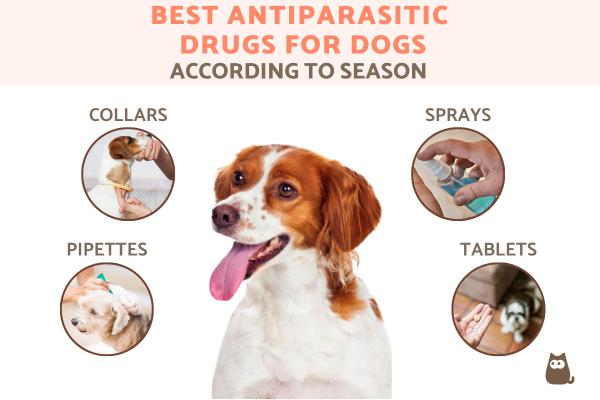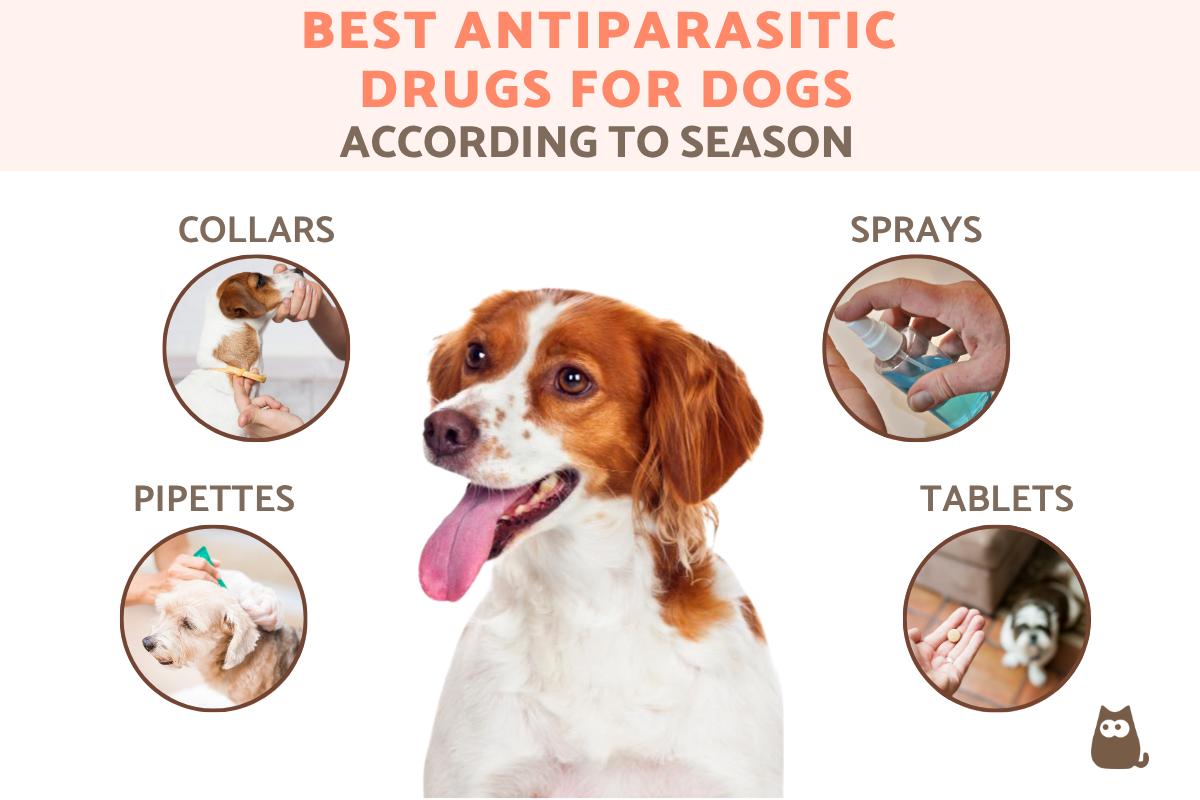Best Antiparasitic Drugs for Dogs According to Season



See files for Dogs
Antiparasitic treatment is essential for dogs, especially if they spend a lot of time in nature. While all dogs will need to be taken outside regularly, some will need more extensive exercise. Taking them somewhere with tall grass and natural sites to explore allows them to express their canine instinct more freely. It also provides greater risk of parasites such as ticks and fleas. Exposure to external parasites increases since they are more likely to come across hazardous material such as animal scat or carrion. While being outside is a risk, these risks may vary according to the time of year.
Dogs will need antiparasitic treatment all year round, but some parasites may provide greater danger at certain times of the year. AnimalWised shares the best antiparasitic drugs for dogs according to season.
Best antiparasitic drugs for dogs in spring
Three of the most dangerous external parasites in dogs are fleas, ticks and mosquitos. Although there is a risk of infected bites, this is not why they are so dangerous. The main danger lies in their ability to be vectors for disease. By biting different animals, fleas and ticks can spread potentially fatal pathogens. Even if they are not fatal, they can seriously compromise their well-being.
While fleas and ticks can be present year round, they are more proliferated when the ambient temperatures rises. Incidences of disease transmission such as leishmaniasis and Lyme disease increase. It is for this reason you should consider the following prevention methods during the spring season for your dog:
- Antiparasitic collars: these are a great option because they offer up to 8 months of protection, right when parasites begin to become active. Different flea collars vary in their effectiveness and duration, so ensure you choose one recommended by a trusted veterinarian. This should be comfortable and waterproof, as well as providing effective prevention against, fleas, ticks and sandflies.
- Monthly pipettes: these are preventive antiparasitic drugs which are dropped onto the back of the dog. The medication then spreads out across the dog and provides protection against these parasites. We need to ensure the dog does not ingest any of the medication, because it will be toxic if ingested internally. This should be repeated throughout the year, but especially in spring.
Discover the different types of tick species which may affect your dog, depending on where you live in the world.
Best antiparasitic drugs for dogs in summer
Although spring begins the season of higher temperatures and increased humidity, this reaches its peak in summer. In addition to the more conducive environmental conditions, we tend to go outside with our dogs more. This provides greater opportunity for a parasitic bite or infestation. Many parasites lurk in the tall grass of the country, with an increased presence in indoor spaces.
For this reason, you will need to ensure you use the following antiparasitics for dogs during summer:
- Combining the collar and pipette: while you will need to check to ensure they can be used together so there are no negative interactions, many pipettes can be combined with the additional use of a collar. This reinforces protection, especially when outside in the country.
- Antiparasitic sprays: these are very useful before hiking in high-risk areas. They don't replace the main products, but they do provide extra security.
- Renew the pipettes monthly: increasing the regularity of administration can provide more total protection. Even a few days' neglect can be enough for the parasites to take effect.
Parasites are not the only concern we have with dogs when the temperature rises. Learn more with our article asking how to keep dogs cool in summer.
Best antiparasitic drugs for dogs in autumn
Even though temperatures are dropping in the fall, the weather is still warm enough in many areas for parasites to remain active. In addition, a dog's fur begins to thicken. This can make it difficult to spot external parasites with the naked eye such as fleas or ticks.
In addition to what antiparasitic products you should use on your dog in autumn, we explain what to consider for their protection during the fall:
- Fast-acting pipettes: these are perfect for responding quickly if a bite is detected. Different products provide different strengths, so consult a veterinarian if you are unsure.
- Regularly inspect their coat: after walks in parks or rural areas, it's a good idea to check the dog's ears, armpits and groin area, parts of their body where ticks often attach.
- Renew their collar: some flea and tick collars have action which lasts for up to 8 months. This means you will need to be considering the purchase of a new collar to replace the old one.
Many people think of using home remedies to treat external or internal parasites in dogs. Unfortunately, the protection they offer is usually very limited. For more detailed information, our related article asks will vinegar kill fleas on dogs?
Best antiparasitic drugs for dogs in winter
Since the temperatures are dropping to their lowest annual ranges, it is easy to think parasites are minimized. Unfortunately, many parasites still proliferate. With factors such as global warming brought upon by climate change, we are seeing an upward trend for the distribution of parasites such as fleas[1]. Although their activity is lower, they may also be more inclined to take refuge in warmer places such as the coat of a dog.
It is also very important to remember that some parasites are not seasonal. They can proliferate almost the same at any time of year due to their less specific breeding conditions. This is the case with many internal or intestinal parasites in dogs. This is why we consider what important factors we need to consider with antiparasitic drugs for dogs in winter:
- Deworming tablets: many of these have an efficacy duration of around 1 to 3 months. They are highly effective against the most common internal parasites, especially parasitic worms such as roundworm or hookworm. Some of these tablets can also work as antiparasitic drugs for external parasites, something which is most useful for dogs which have an issue wearing collars or using pipettes.
- Occasional use of pipettes: if you live in areas with mild winter temperatures or go on regular trips to the countryside, don't be overconfident. A simple outing can be enough to cause an infestation. The use of antiparasitic pipettes can help provide the right level of protection.
During this time, maintain good hygiene on blankets, beds and carpets. Fleas can live for months in larval form, waiting for optimal conditions to proliferate again.
Other factors you should take into account with antiparasitic drugs for dogs
In addition to the season, there are individual aspects of your dog that also influence the choice of the ideal antiparasitic drug or parasite prevention program you will need to implement. Some of the most important factors include the following:
- Size and weight
- Whether the dog has regular access to a garden
- Living with cats (some pipettes can be toxic to felines)
- Frequent bathing in the sea, pools or other bodies of water
- Sensitivities to any of the active ingredients or excipients of antiparasitic drugs
For all of these reasons, we always recommend consulting with your trusted veterinarian before changing which antiparasitic drug you use. Every dog is unique and has their own specific considerations which need to be made. To keep your dog healthy, protecting them from parasites is essential. By doing so, you not only save him from itching and discomfort, but you also keep him away from serious diseases that could seriously affect their health.
Keep in mind that each season brings its own challenges. If you protect your dog responsibly, they can enjoy good health year-round. In addition to deworming schedules, speaking to a veterinarian also helps you begin a vaccination schedule for your dog which provides important protection against disease.
This article is purely informative. AnimalWised does not have the authority to prescribe any veterinary treatment or create a diagnosis. We invite you to take your pet to the veterinarian if they are suffering from any condition or pain.
If you want to read similar articles to Best Antiparasitic Drugs for Dogs According to Season, we recommend you visit our De-worming category.
1. Wang, Z., Chang, N., Li, H., Wei, X., Shi, Y., Li, K., Li, J., Guo, C., & Liu, Q. (2024). Impacts of climate change on the potential distribution of Pulex simulans and Polygenis gwyni. Ecology and evolution, 14(7), e11621.
https://doi.org/10.1002/ece3.11621





